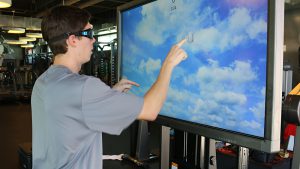Duke Launches Sports Vision Center

Reprinted with permission from Senaptec.
In summer 2017, Duke launched the Duke Sports Vision Center (DSVC), an innovative program to evaluate and apply new and existing approaches to optimize visual–motor performance in visually demanding activities. The center is a combined venture between the James R. Urbaniak, MD, Sports Sciences Institute, the Duke Eye Center, and the Department of Psychiatry and Behavioral Sciences and includes specialists in ophthalmic care, sports vision, cognitive neuroscience, occupational and physical therapy, and concussion rehabilitation.
Developed by chief of Cornea and External Disease, Terry Kim, MD; chief of Low Vision Rehabilitation, Diane Whitaker, OD; and director of the Brain Stimulation Service Center in Psychiatry and Behavioral Sciences, Gregory Appelbaum, PhD, the center has 3 primary goals. First, the ophthalmic team focuses on eye care, injury prevention, and treatment in athletes and military personnel.
Second, DSVC seeks to provide the most advanced eye care and neurocognitive interventions to help rehabilitate or improve high-performance vision. Finally, researchers at the center are studying the outcomes of their interventions to see whether they can be validated by the standards of evidence-based medicine.
“We already know that people can follow these protocols and get better at doing certain activities within a training device,” Whitaker explains. “What we want to know is whether what they did on that device makes them a better basketball player. Anecdotally, people come back and report improvements in performance, but no one has done a study on the direct translation from device-based training to actual on-field or -court performance.”
The DSVC offers 2 visual skills programs: 1) The Select Skills Training program, designed for community athletes and athletes seeking rehabilitation for a vision-related injury, uses digital and naturalistic instruments including the Senaptec Sensory Stations, Strobes, Sync Light Rail, the FitLight, and Oculomotor and Balance Boards and 2) the Elite Skills Training program, targeted at healthy premier athletes who are seeking to improve their visual–motor performance, builds on the Select Program to also include Virtual Reality Training, Cognitive-Enhancement Training, and NeuroPriming.
Before they begin, program participants undergo an ocular health examination and sensorimotor skills evaluation to assess visual acuity and identify individual strengths and weaknesses. This allows DSVC clinicians to tailor a customized visual skills training program to each patient. The data collected during evaluations and training will contribute to ongoing research efforts aimed at improving the center’s sports vision training approach.
“We’re very excited to be part of the first multidisciplinary sports institute in the nation that will incorporate the latest technologies and research to help optimize the visual and athletic performance of our patients,” Kim says.